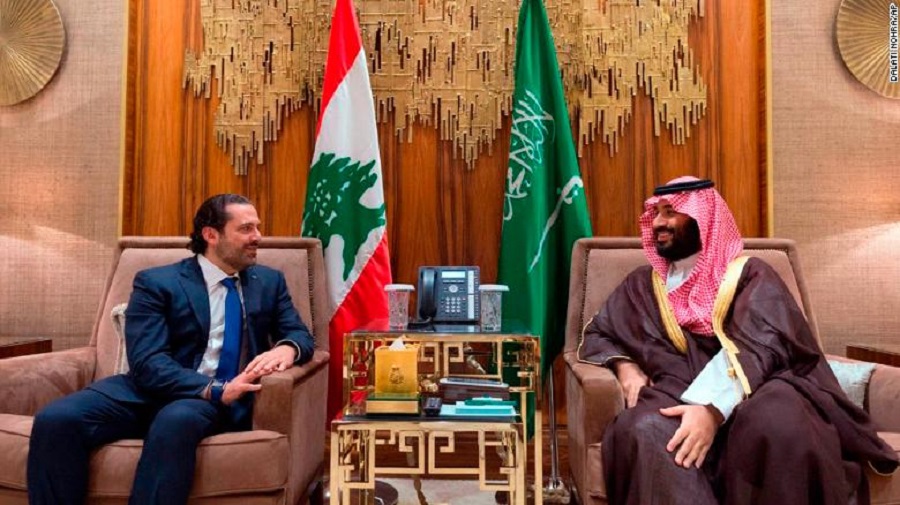
Saudi Crown Prince Mohammed bin Salman meets with then-Lebanese Prime Minister Saad Hariri in Riyadh, Saudi Arabia on Oct. 30, 2017.
Lebanon's Prime Minister Najib Mikati is due to visit Saudi Arabia in the next two weeks, a first trip by a Lebanese premier to the Arab powerhouse in almost four years following an unprecedented rupture in relations.
The last visit was in 2018 by then-Prime Minister Saad Hariri, who in 2021 stepped down nearly nine months after he was tasked with forming the country's government.
One of Lebanon's biggest benefactors, Saudi Arabia's ties with Beirut had been progressively deteriorating over the past decade, a split fueled by Iran-backed Hezbollah's growing influence in the country. This came to head in 2017 when Hariri, once Saudi Arabia's main ally in Lebanon , resigned in a televised statement from Riyadh. Lebanese politicians said he was forced to take the decision after being detained in the kingdom. Hariri and Saudi Arabia denied those claims.
The tensions culminated in a break in relations in October following Lebanese information minister George Kordahi's open criticism of the Saudi-led coalition's war in Yemen. The comments were made before Kordahi took office, but Saudi Arabia and other Gulf states withdrew their envoys from Beirut after recordings of the criticism resurfaced. The minister subsequently resigned.
Lebanon has for more than two years been suffering from a financial crisis the World Bank says is one of the world's worst since the nineteenth century. The Levantine country's woes have been further exacerbated by political wrangling, corruption and disputes over a delicate power-sharing system.
Ties with Riyadh seem to be on the mend, however. Saudi Arabia and its Arab allies Kuwait and Yemen have said they'll re-instate their ambassadors in Beirut. The Saudi ambassador to Lebanon also hosted a Ramadan iftar banquet, which was attended by Lebanese leaders and former officials.
Do Saudi and Arab overtures to Lebanon point to a change of heart? And why now?
How much had Lebanon's relationship with Saudi Arabia and other Gulf states deteriorated since 2017, and especially over the past year?
The relationship for a number of years has been problematic because the Saudis had a sensible belief that Hezbollah is the dominant political force in the country. In part this has also been exacerbated by the fact that Hezbollah has sided with the Houthis in Yemen, and of course is a close ally of Iran. This has generated Saudi ill-will toward Lebanon. This situation has also been made worse by the fact that the relationship between Saudi Arabia and Hariri has not really been very good in recent years.
At the same time, I think Saudi interests had shifted elsewhere. The Saudis' eye is of course on Iran, but the relationship with the United States and the war in Yemen have been a major preoccupation.
What do you make of the recent overtures from Gulf states? Are ties on the mend?
There is a new way that the Arab countries in general are dealing both with Syria and Lebanon... The opening toward Lebanon is something along the lines of the opening toward the regime of Bashar al-Assad. These two aren't completely separate.
The Arab attitude today is that they need to engage more with Syria and Lebanon. If they want to contain Iran in the region, they need to reopen ties, [and] rebuild their stakes in countries like Syria and Lebanon. And therefore it makes sense for them at this time, particularly if the JCPOA [the collapsed 2015 Iran nuclear agreement currently in renegotiation] is going to be signed, to take a new position -- no longer a policy of isolation, but a policy of building up their stakes in both countries.
How does Lebanon benefit from improved relations with Saudi Arabia? Could they help it get out of economic turmoil?
I don't think anyone wants to give money to Lebanon until there are economic reforms in the country. No one wants to lose money in Lebanon as they did before. If in the future Lebanon is going to benefit from economic aid, obviously this has to come mainly from the Arab world, particularly the Gulf Arab countries. Any Sunni prime minister in Lebanon, and particularly the present Sunni Prime Minister Mikati, has an interest and is very keen to have good relations with the Gulf countries. And they don't want to allow Hezbollah to undermine such relations.
I don't see money coming from the Gulf states until reforms are introduced ... The Gulf is going to look at things like the progress of Lebanon's deal with the IMF (International Monetary Fund). If Lebanon introduces reforms and the IMF deal goes through, then there is a good possibility they will help Lebanon. But until then, the most they are willing to do is to help Lebanon on humanitarian grounds, which basically means that they won't work through the Lebanese state.
What to watch
As tensions between Israel and Palestinians rose in Jerusalem over the weekend, Palestinian politician Dr. Mustafa Barghouti, told CNN's Becky Anderson that Palestinians are angry at the international community's "double standards" when it comes to Israel.
"Russia receives more than 6,000 punitive acts and sanctions, [whereas there is] not a single sanction against Israeli occupation," he said.
Watch the interview here.
Around the region
'Suits Arabia,' the Arabic adaptation of the hit American series 'Suits,' is being sued by an Egypt-based fashion brand, which claims that the show's producers failed to pay for the suits worn on the show.
'Suits Arabia' was a highly anticipated show this Ramadan with some high-profile cast members such as Saba Mubarak and Asser Yasin starring in the legal drama.
The OSN originals show almost mirrors the sequence of events of its American counterpart. The core cast has been given Arabic names such as Zain Thabet for Harvey, Adam Mansour for Mike and Laila Radwan for Rachel.
The story follows a lawyer with a photographic memory but no law degree who is taken under the wing of a skilled, well-dressed attorney with a penchant for winning cases. It's the US show that introduced the now Duchess of Sussex, Meghan Markle, to viewers and the world.
Keeping true to the original series, the characters in "Suits Arabia" are decked out in couture suits supplied by the fashion brand Orange Square. The fashion house, which is suing the show's production company TVision Media for about $145,000 for the price of the clothes and over $540,000 for damages, told CNN that the show failed to pay for any clothing provided for the show and called for the series to be taken off the air until the money is paid.
In a statement to CNN, Orange Square says it is entitled to damages "as a result of the exploitation of its products and the non-payment of its price."
TVision expressed shock at the claims in a statement posted on its Facebook page, saying it has a 20-year reputation in the industry for honoring all financial commitments. The production house has since filed a counter lawsuit for civil reimbursement of upwards of $1 million for damages, according to the statement.
"It is important for the company to assure that it owes nothing to anyone," reads the statement.
Orange Square told CNN that a court date has been set for May 7 in Egypt and a motion has been filed to stop the broadcast of the show till the full amount has been paid.













